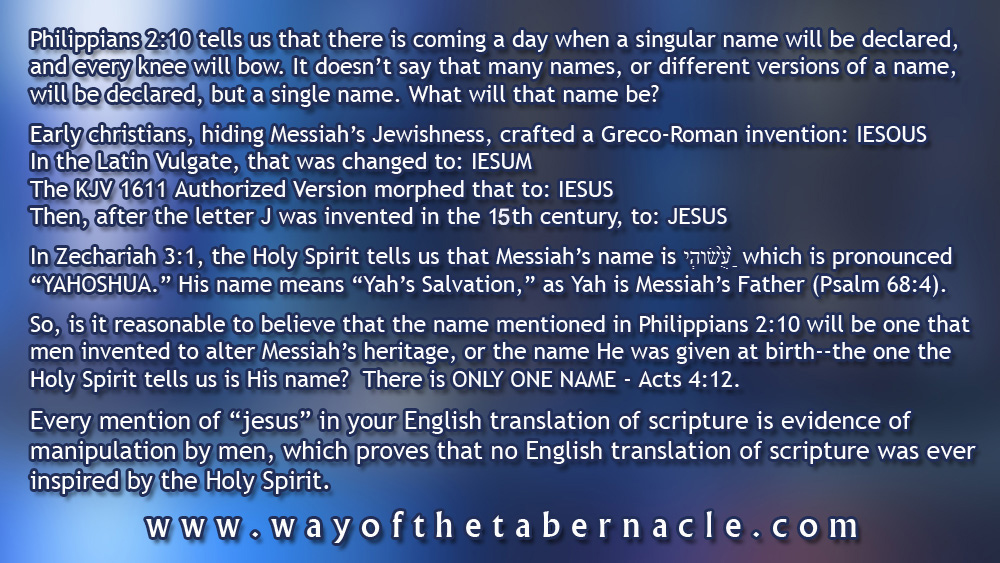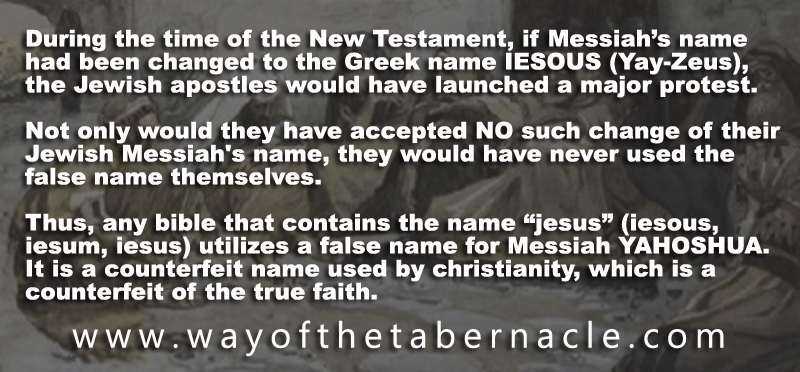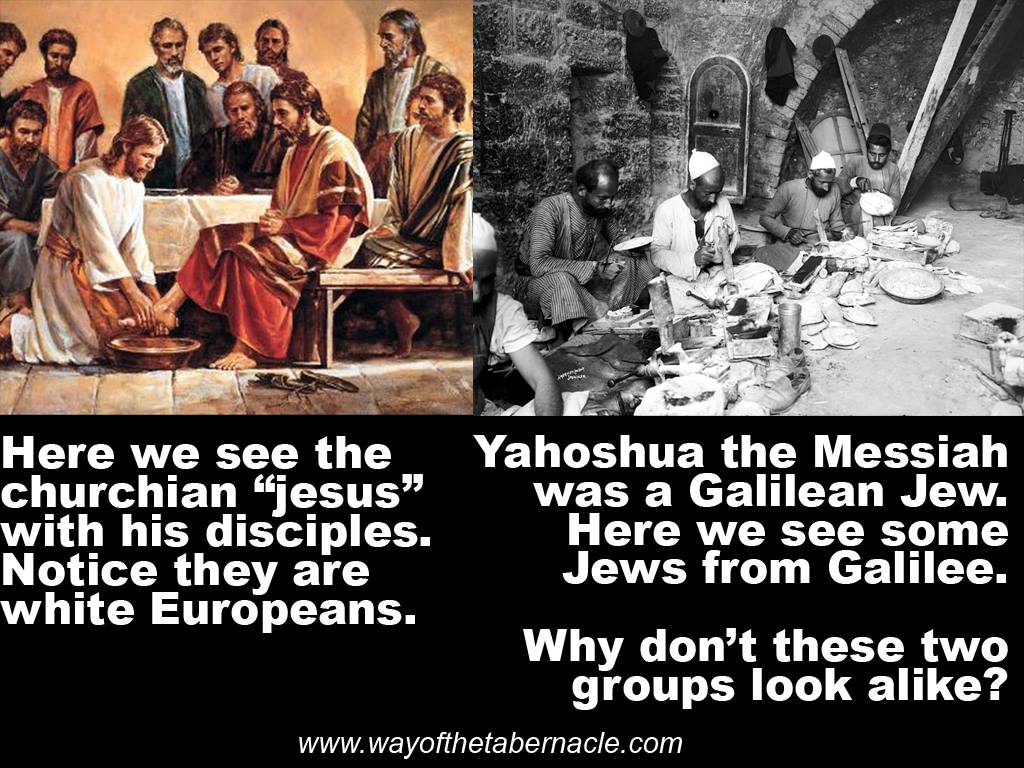Nobody in Scripture Ever Knew Jesus
Imagine, if you will, that your name is James, and you are embarking on an international trip. At your first stop, Tel Aviv, you are met by officials, and they examine your passport. “You are now 'Ya'akov,'” which is the equivalent of “James” in Hebrew. They tell you that, in certain areas of their country, you could also be called “Jacob,” because those areas have become more Anglicized.
Next, you travel to Rome, and again, are met by officials, but this time, you are told that, while visiting there, your name is Giacomo, not to be confused with your name in Madrid being Diego, or that in the Philippines, you will be Jaimé, and in Athens, you will be Iakov.
Now, think about it. If you were to make that trip, do you honestly believe your true name would change based on the language that is spoken by the people where you were? That just defies all common sense, not to mention reality. Your name is the name you were given, and it never changes because someone else speaks a different language.
So, why is it that so many churchians falsely believe that the names of the Creator and His Son change based on someone's language? That erroneous belief is one of the craftiest deceptions Satan has been able to inflict upon mankind—obscuring the true names of the Father and the Son.
But, does that even matter? Where the Father is concerned, we're told in scripture to call upon His name. But, what is His name?
Sing unto Elohim [a title that means “God”], sing praises to His name: extol Him that rideth upon the heavens by his name YAH, and rejoice before Him. Psalm 68:4
So, as we can see, His name is Yah (or Yahweh, which is a reiteration of His name). His name is not “God,” as that is an English word that is only one of His many titles. Many falsely claim that the Father and Son have many names, but they don't. They have many titles—a title is not a name. Your doctor's name isn't “doctor,” your teacher's name isn't “teacher,” your spouse's name isn't “spouse,” and your child's name isn't “child” (at least, I hope it's not). Those are all titles that describe aspects about people, but their names are the identifiers they are given at birth—and, they don't change apart from someone willfully adopting a different name, or the Creator Himself renaming him. Neither of those things has ever happened where the Father and Son are concerned.
What are we told about the Son's name? We are to “believe in His name.” But, what does that mean? Asking most in the “church,” the answers given will not be correct, as most don't actually know what His name is—or what it means. Acts 4:12 tells us that there is “no other name under heaven given among men whereby we must be saved.” And, “no other name” literally means “only one name.”
If one doesn't know Christ's actual name (“Christ” is a title), then how can he properly believe in it?
Are you aware that nobody in the whole of scripture ever knew anybody named “Jesus”? They couldn't, as that name couldn't exist until the 16th century when the letter “J” was invented (in fact, the name "jesus" didn't exist until the 17th century!). Neither did anyone in the first century ever know the Greek “iesous,” which is where the English “Jesus” is derived. That name was invented centuries after Messiah (a title) walked the earth.
So, are we told anywhere in scripture what Messiah's name really is, apart from the invented name that appears in your English translation of the scriptures? And, if we are told, then isn't that the name He would prefer for us to use in our identification with Him?
If we look in Zechariah 3, the chapter starts with this: “Then he showed me Joshua the high priest standing before the angel of Yahweh, and Satan standing at his right hand to accuse him.” The scene is heaven immediately following the Son's ascension back to His Father.
We already know His name couldn't be “Joshua,” as the letter “J” didn't exist when the scripture was written. However, most of the names in our English translations of scripture have been transliterated—which is a phonetic approximation of the actual name. So, in this, we can see some deception going on, as “Joshua” is a far closer version of Messiah's name, and “Jesus” isn't even close.
In the Hebrew, the name given in Zechariah 3:1 is יְהוֹשֻׁ֙עַ֙ , and that name is pronounced "Yahoshua." The Spirit tells us, through the words He inspired in Zechariah 3, that Messiah's name is “Yahoshua,” which is also the real name of the person in the Old Testament we know as “Joshua.” You may have seen some spell it “Yehoshua,” but that is misleading, as Hebrew is read from right to left, and the first syllable in that Hebrew name is YAH (not yeh). The name is Yah's salvation, not yeh's salvation.
We see in Matthew 1:21-22, Matthew recorded these words about a message given to Joseph, Mary's betrothed husband: “But when he had considered this, behold, an angel of Elohim [the supreme God] appeared to him in a dream, saying, 'Joseph, son of David, do not be afraid to take Mary as your wife; for the Child who has been conceived in her is of the Holy Spirit. She will bear a Son; and you shall call His name ____________, for He will save His people from their sin.'”
Now, it is important to know that Matthew, Mark, John, and Peter were all traditional Hebrew-speaking Jews who would have never written to other Jews in anything but Hebrew. These were men who struggled initially after the resurrection with accepting Gentiles because of their strict reverence for the written law and what their Jewish heritage had meant for them spiritually. Moreover, as we know (but is also often denied by many in the “church”), Papias of Hierapolis, a historian who lived from 70-163 AD, tells us that the Book of Matthew was written in Hebrew, and then others translated it.
So, in that verse in Matthew 1, it is not even remotely conceivable that Matthew would have chosen to use a Greco-Roman name that had not even been invented to identify His Messiah to other Jews. But, there is even further proof that Matthew wrote that His name was to be “Yahoshua,” and that is because Matthew tells us Joseph was told WHY He was to be given that name. It is “because He will save His people from their sin.”
I know some of your English translations use the word “sins” there, but that is also false interpretation, as the word actually means “unbelief,” and that is a singular condition, the sin leading unto death (as opposed to “sins of the flesh,” which are sins not leading unto death).
But, the point here is that Joseph wouldn't have been told the reason for the name if that reason wasn't inherent in the name itself. The word “Jesus” has no literal meaning. Since the invention came through the Latin from the Greco-Roman monstrosities of Constantine and his Roman cohorts, the closest Latin word is “sus,” and that means “pig.” Joseph would not have been told a reason for a name that has no actual meaning.
So, believing on the name of Yahoshua means to believe on the meaning of His name—Yah's salvation. His name explains who sent Him (Yah) and why He was sent (salvation), which is what Matthew records (“because He will save His people from their sin”).
In Acts 26;13-15, we see Paul recounting what had happened to him on the road to Damascus:
“While so engaged as I was journeying to Damascus with the authority and commission of the chief priests, at midday, O King, I saw on the way a light from heaven, brighter than the sun, shining all around me and those who were journeying with me. And when we had all fallen to the ground, I heard a voice saying to me in the HEBREW dialect, ‘Saul, Saul, why are you persecuting Me? It is hard for you to kick against the goads.’ And I said, ‘Who are You, Lord?’ And the Lord said, ‘I am ______________ whom you are persecuting.”
It is not even reasonable to conclude that Yahoshua would have spoken to Sha'ul Paulus (Paul's actual name), a Jew, in Hebrew, and then identify Himself by a Greco-Roman name that still wasn't going to be invented for centuries. He said, “I am Yahoshua whom you are persecuting.”
For that reason, I choose to identify Him by the name He uses to identify Himself.
Of course, looking back on that fallacious reasoning at the beginning of this article (one's name changing because he is in different countries), I am often told by churchian folks that they will call Him “Jesus” because they don't speak Hebrew. Can you see now how absurd that thinking is—that someone's name changes because of the language someone else speaks?
If you think that's sufficient explanation for denying the true name of the Messiah, then I would ask you this: Do you speak Chinese? What name do you use for Mao Tse Tong? Do you speak Hindi? What name do you use for Mohandas (Mahatma) Ghandi? Do you speak Arabic? What name do you use for Osama bin Laden? The list could go on and on.
One doesn't change the names of real people based on the language he speaks. That is only done with false gods and some fictional characters—which is at the core of the enemy's deception here. To believe that one can arbitrarily change the actual names of the Father and Son based on the language one speaks is to identify the Creator and His Son, the Perfect Lamb, as fictional, or imaginary. Real people have real names.
Of course, Yah has grace for our ignorance, and even mercy for our rebellion; but, once we are shown any truth, we are accountable for it. Knowing now what the true names of the Father and Son are, and then choosing to embrace false names, is just a sign of rebellion against His truths. Does that mean that such a person will not go to heaven? This has nothing to do with justification, but with identification.
One's relationship here and reward in eternity will be based, largely, on his choice to identify with Yah and His truths. To honor His Sabbaths is a choice to identify with Him. To sacrifice one's flesh is a choice to identify with Him. To call Him by His real name is a choice to identify with Him. “God” (as a name), and “Jesus” are false traditions of men. Yah and Yahoshua are their names. I will choose to identify with them in truth, and I will willfully reject the traditions of men.




Salvation
Traditions
Other Truths
But now in Yahoshua the Messiah you who formerly were far off have been brought near by the blood of Christ. For He Himself is our peace, who made both groups into one and broke down the barrier of the dividing wall, by abolishing in His flesh the enmity, which is the Law of commandments contained in ordinances, so that in Himself He might make the two into one new man, thus establishing peace, and might reconcile them both in one body to Yah through the cross, by it having put to death the enmity. Ephesians 2:13-16




